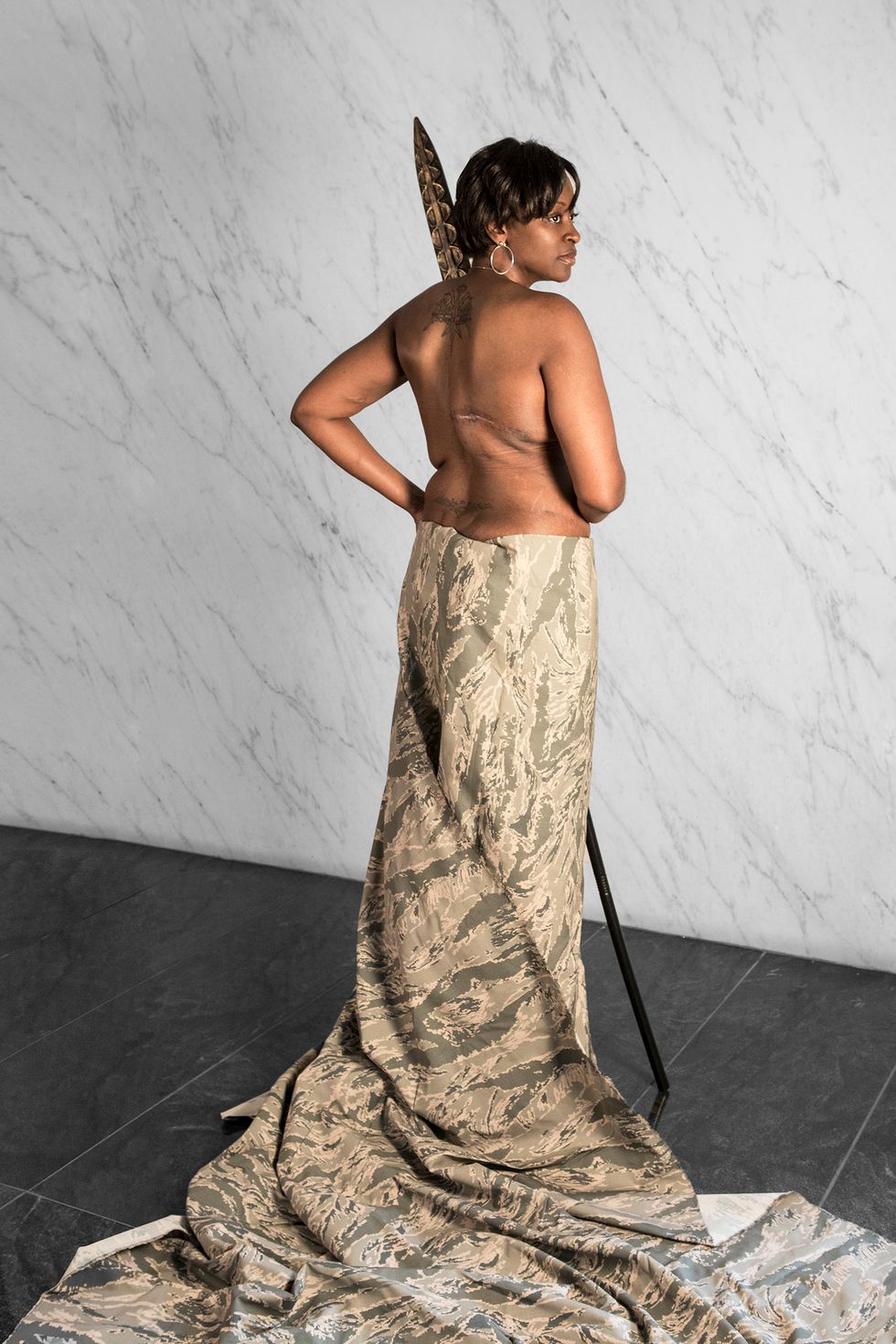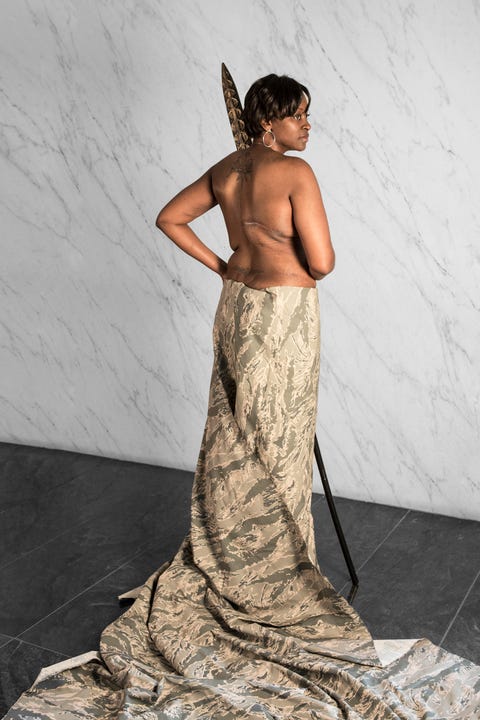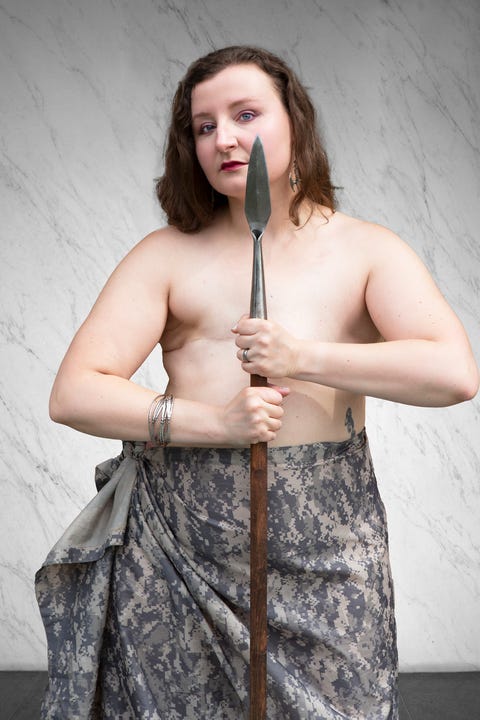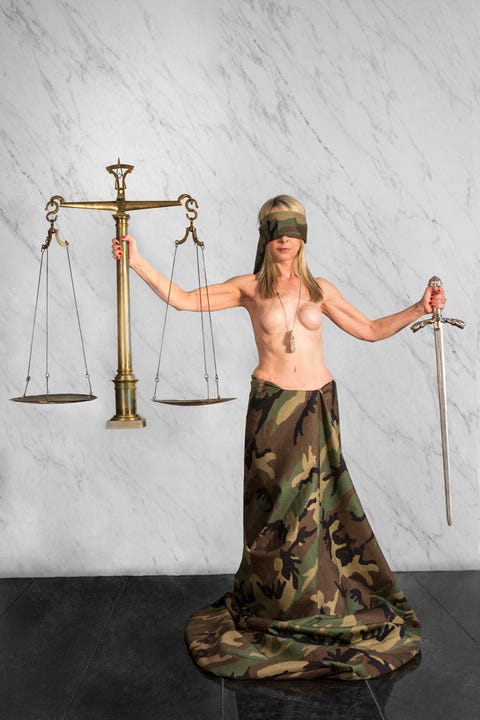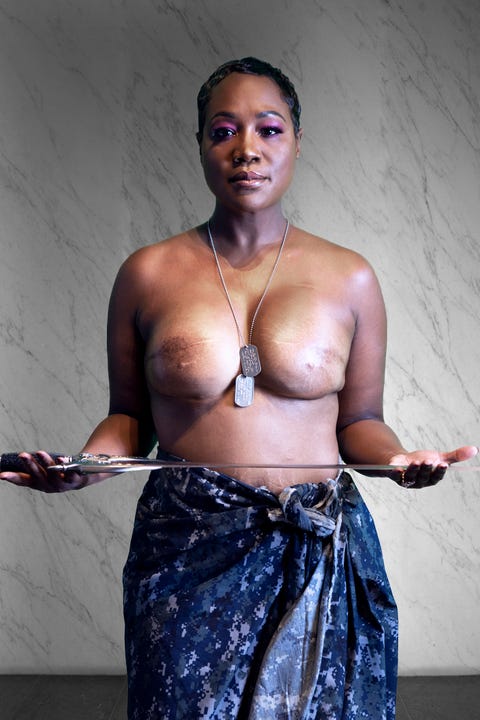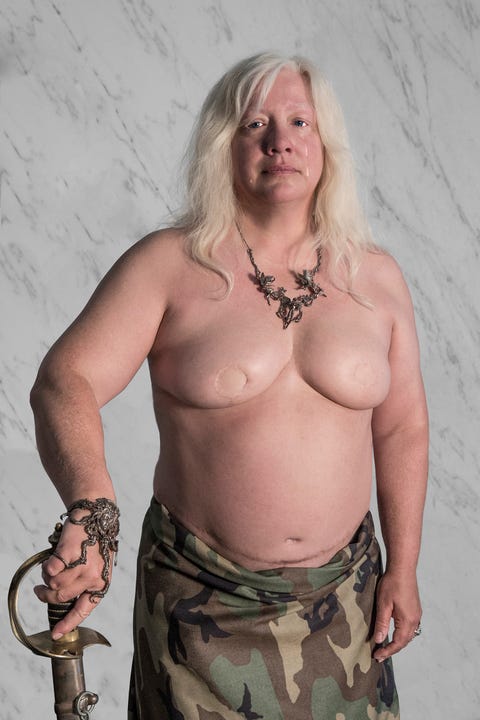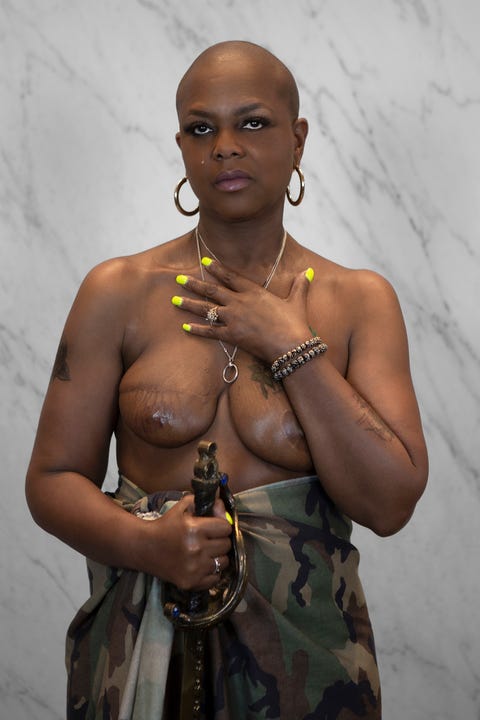How a Photographer Finds Beauty in Breast Cancer Survivors’ Scars
While sourcing inspiration for The Grace Project, a photo series capturing the courage of women in the military who have undergone mastectomies as a result of breast cancer, Charise Isis looked to the past. “The thing that came to me was the Venus de Milo, which has survived the trauma of history but is still this cultural icon,” the photographer tells ELLE.com. “It’s a really beautiful way to see scars as having value for surviving.”
For nearly 15 years, Isis has been photographing women with breast cancer—draping their bodies in silky fabrics just like the ancient sculpture. Her mission is to help women reclaim their stories, while also shifting public perceptions of beauty and body image standards. “You’re standing in front of my camera and saying, ‘These are my scars, and I can’t change it,’” Isis says of the concept. By showing up, her subjects feel heard. “You’re asking the world to accept you, while also learning to accept yourself,” Isis adds.
She started shooting veterans impacted by breast cancer seven years ago, after research found that military women were up to 40 percent more likely to be diagnosed with the disease compared to their civilian counterparts. CBS reports that the United States Department of Veterans Affairs has identified over 600 veterans deployed during recent wars who have filed claim for military service-connected breast cancer. Of those claims, benefits were granted to around 56 percent of people, per CBS.
Isis covers the veterans in camouflage fabric, and asks them to pose with Hellenistic weapons. “It’s a very powerful thing to hold a sword or a spear,” she explains. This mini-series within The Grace Project is aptly called the “Athena Division” after the goddess of war, and is currently on display at the Military Women’s Memorial in Arlington National Cemetery, with plans to become a traveling exhibit across the country.
So far, Isis has shot 643 portraits for The Grace Project. Her mission is to get to 800—the same number of people diagnosed with breast cancer every day in the U.S. Below, in her own words, Isis takes us behind the scenes of her powerful “Athena” series featuring vets from the Army, Air Force, and Navy.
Catherine, Air Force
“Catherine was really young when she noticed that her nipple was bleeding. It totally freaked her out, so she went to the doctor. Turns out that she had breast cancer. About six years later, she discovered that she had cancer in the other breast. Catherine had a TRAM flap surgery, where they take fat out of a part of the body and implant it into the breast. I photographed her from the front, but I also photographed her from behind, so you can see the scar on her back. Part of the reason Catherine wanted to be photographed is because she feels that Black women don’t talk about cancer enough. She really wanted to raise awareness in her community.”
Diana, Army
“Diana is fully blind in one eye, and partially blind in the other. On top of that, she also has metastatic breast cancer. Somehow, through it all, she manages to stay incredibly positive. She has had more difficulty in her life than anybody ever should, but insists on using positivity to move forward. She travels, goes off on her own, and does whatever she wants. She is so inspiring to other people with cancer because of how she has pushed through the sadness. This girl doesn’t let metastatic breast cancer keep her from anything.”
Donna, Army
“Donna was like an athlete—really fit and strong. At the time this photo was taken, we didn’t know how quickly her cancer was progressing. She didn’t tell anyone, because she wanted to remain respected in her field as a lobbyist for women’s rights. Then, in 2020, she passed away from metastatic breast cancer. It was really devastating for me. She would be so proud of the work we’ve continued to do.”
Melinda, Navy
“When Melinda found a lump, her doctor told her it wasn’t breast cancer and that she didn’t need to worry about it. ‘You’re young, you’re healthy,’ the doctor told her. But Melinda, who is really into health and fitness, knew her body—and something definitely wasn’t right. She went to a different doctor and, as it turns out, Melinda was, in fact, correct. She was diagnosed with stage one breast cancer, but a few weeks it turned into stage two cancer. Her message is to believe in you. If you feel like something is wrong with your body, advocate for yourself. Melinda did, and because of that she ended up catching the breast cancer early enough to treat it. If she had listened to that first doctor, chances are she could be at stage four now.”
Michelle, Army
“Women in the military often push down their emotions, because they feel that they have to be stronger than the men they serve with. So when I photograph military women, it can get really emotional. A lot of them tell me it’s the first time they’ve allowed themselves to cry about their cancer. In Michelle’s case, standing in front of my camera—and having someone see her for what she’s gone through—was a huge emotional release. Michelle worked as a mechanic on homes and military vehicles, and has been diagnosed with ocular and breast cancer. Her tears in this photo are so profoundly connected to her story.”
Sheila, Air Force
“When Sheila was diagnosed with breast cancer, she was told she had three years to live. That was 12 years ago. She is a woman of faith who believes that God has given her those extra years for a reason. She believes she is a vessel to help make a difference. She’s become this fierce advocate for metastatic breast cancer, and for getting the word out to Black women. She also feels that it’s really important to get the message out to veterans and active military. Even though she is retired, she feels like she’s still serving on some level. In a way, her advocacy is a part of her service.”
Rose is a Senior Editor at ELLE overseeing features and projects about women’s issues. She is an accomplished and compassionate storyteller and editor who excels in obtaining exclusive interviews and unearthing compelling features.

